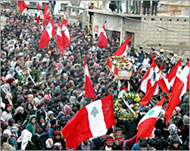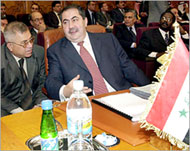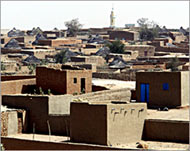Arab reform alternative
Who bears the responsibility for reforming the Arab world?

Is there such a thing as collective Middle East reform? What is the Arab response and alternative to US-sponsored reform initiatives?
Aljazeera.net put these and other questions to Muhammad Bahi, a Moroccan journalist and columnist for Assahraa newspaper and the author of 23 books.
Bahi is a well-known intellectual and an accomplished writer. Originally from the south of Morocco, he was detained for 10 years as a political prisoner – three of which he spent in an Algerian prison and the rest in the Polisario Front’s jails, a movement formed in 1973 under the banner of West Saharan independence from Morocco.
Aljazeera: It is becoming clearer by the day, that Arab leaders are unable or unwilling to develop a collective reforms strategy. What are the implications of such a failure, if it persists?
| ||
|
|
Bahi: My hope is that we can avoid complete failure. Arab leaders must realise that they have no choice but to cope with the overriding changes happening in the international arena.
All of this is happening while Arab societies remain under-developed.
What makes the need for reforms more imperative than before is that today’s generations possess greater awareness than past ones. Thus the gap is growing between the governments and the masses.
To narrow the gap and to avoid a clash, Arab leaders must act immediately to meet the needs of their peoples, whether it is cultural, social or economic.
Aljazeera: Where are the Arabs on the scale of reforms: are they progressing, declining or at a stand-still?
Bahi: Arabs are facing a dilemma; as far as intellectual awareness, the Arab people are more politically enlightened than ever.
Today’s generation is more educated and is able to cope with the spirit of the evolving world around it.
On the other hand, the leaders linger in the spirit of years past, unable to depart from the ideological frameworks of the 1950s and 60s.
Arab governments need to completely revamp their perception of history and reality. Without it the dilemma shall carry on.
Aljazeera: But what if Arab leaders remained unable to present a genuine reforms strategy?
|
“The [Arab] leaders linger in the spirit of years past, unable to depart from the ideological frameworks of the 50s and 60s” |
Will that mean the Arabs are left with no choice but to accept reform initiatives introduced or imposed from the outside: particularly the most recent Greater Middle East Initiative of the US government?
Bahi: There is no doubt that democracy is now a popular demand among various Arab nations.
But imposing democratic solutions from the outside, in my opinion, will hamper the drive toward democracy by the people.
This is why I feel compelled to repeat: the gap should be narrowed between the governments and the populace.
Free and fair elections must be held in order for the people to respect the role played by those who supposedly represent them.
Such mending of relationships is a prerequisite to any meaningful democratic change in our society.
Aljazeera: Who bears much of the responsibility for reform or for pushing for reforms: the government, NGOs or the people?
Bahi: The responsibility for reform falls on everyone who genuinely believes in democracy and a civil society.
The Arab people are ready and capable of handling such a task. But democratic reforms can be a very delicate process.
Some political parties and non-governmental organisations are often accused of having “foreign” links.
 |
|
Arab parties aligned themselves |
This may or may not be true. The bottom line is that if the aspect of credibility possessed by these parties is not secured, then taking part in such a delicate process shall be too difficult.
During the 1950s, 60s and even 70s, many political groups in the Arab world defined themselves based on their status as pro the Western camp, the capitalist world, or the eastern camp, communist Russia.
Only a few maintained a free will and genuinely spoke on behalf of the local concern of their people.
Arabs must think first in terms of their own needs and wants not the needs and wants of outside forces that are solely concerned with their own needs and wants.
Aljazeera: Where do reforms start?
Bahi: Arab civic societies must have all the basic rights, including the formation of political parties, freedom of association, freedom of expression, freedom of organising trade unions and such like.
If these mere basics are missing, then tangible reforms are unattainable.
Aljazeera: Do you believe that Arab rulers are capable of forging an independent reforms initiative that can be carried through and implemented on a large scale?
Bahi: In the final analysis, I must say no, they are not capable of such an endeavour because, first, they lack the unity required to stand up to outside pressure.
|
“Genuine reforms leave no room for installing rulers for life” |
Second, they must be aware of the truth that genuine reforms leave no room for installing rulers for life, which many current Arab leaders cannot live without.
Aljazeera: Some Arab intellectuals argue that the US’s main objective by pushing its own reforms initiatives on the Middle East is to divide the Arab world, territorially or perhaps geopolitically.
Is there any truth to such an assertion?
Bahi: I do believe that there is much truth to this assertion and it can be demonstrated through history and the unfolding events in the Arab world.
Our response to this is to activate our society and develop our own reforms priorities.
As far as outside initiatives are concerned, almost every initiative that was enforced from the outside was doomed to failure because it was designed to serve the interests of outside interests not the local population.
In their recent history, Arabs faced all forms of colonialism, but mostly economic and military.
The Greater Middle East Initiative is colonialism under another title.
Aljazeera: But why the assumption that the Greater Middle East Initiative is intended for any other purpose but to benefit the Arab people?
Bahi: Seeking such over-generalisations shall contribute little but over-simplify a complicated question.
The American-sponsored initiative for example fails to note how vastly different the Arab world is from one region to another.
|
The American-sponsored initiative for example fails to note how |
For example, the Arab North African region led a different experience from the rest of the Arab world. This needs to be taken into account.
In Morocco for instance the multi-party system was instituted as early as the 1940s and they maintained a level of independence that was very significant.
These parties led an uprising against the French and adapted to the political changes in the country once Morocco gained independence.
Their job was then to struggle for a democratic constitution, free elections and so forth.
This is one of several experiences that must be considered before making sweeping generalisations about reforming the Arab world.
Aljazeera: But shouldn’t the Arab League be instrumental in employing the Arabs’ own experiences to mould an Arab reforms agenda?
 |
|
Bahi says the Arab League’s |
Bahi: The Arab League is an organisation whose objective is to simply coordinate Arab action in regards to economic integration.
As far as its political clout, I think it has a very minimal role since politics is an internal affair for each individual country.
The decision for reforms has to be made on the individual country’s level not the leagues’. This doesn’t negate the fact the league can be instrumental in employing its work on the fields of economic integration and long sought open common market to encourage political coordination as well.
If done right, this could lead to a model similar to that used successfully in Europe.
Aljazeera: So, it makes no sense demanding the Arab League introduces a pan-Arab reform initiative?
Bahi: I don’t think that the league has the tools needed for such a task. What happened at the botched league’s summit last March demonstrates such a fact.
So far, the league’s meetings have been a stage of dispute between various Arab countries and their endless conflicts of interest.
Aljazeera: If neither Arab leaders nor the league are capable of championing or offering reform initiatives, who can?
Bahi: I strongly believe that the intellectuals, civic organisations and existing political parties in various Arab countries are capable and qualified to shoulder the process of reform.
Aljazeera: How can you be so sure considering that Arabs have no real experience where these forces managed to leave their mark on the political life of most Arab countries?
Bahi: True democracies must start with these institutions. We wish to see political parties and non-governmental civic organisations given the opportunity to take part in decision-making, drafting democratic constitutions that defend freedom of expression, freedom of association, formation of political parties and observation of human rights.
Once such an opportunity is presented, then I guarantee you that they will leave a mark.
